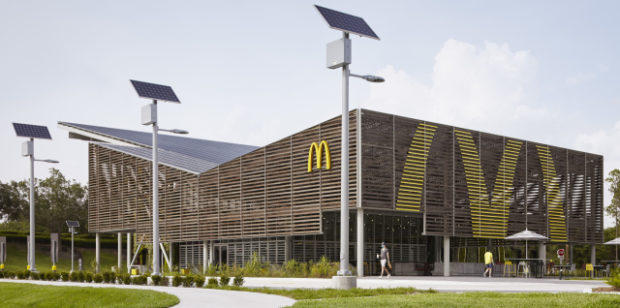Fast food chains reimagine restaurants’ design to be more eco-friendly

The McDonald’s restaurant of tomorrow is situated within the Walt Disney World Resort in Florida.Image: McDonald’s/Ross Barney via AFP Relaxnews.
Photovoltaic panels, walls of vegetation, interior temperature control — the fast food industry is not just betting on the elimination of straws to play its role in a less energy-intensive world.
Fast food chain McDonald’s, for example, has developed a brand new restaurant concept that runs solely on renewable energy. As part of the collective effort to reduce the carbon footprint of human activity, fast food giants are not only ditching plastic straws, like Starbucks in 2018 and Subway in 2019, nor are they content with designing next-generation cups like McDonald’s, which has been phasing out plastic lids since last November. They are not just printing receipts on napkins like KFC in Dubai, nor cooking burgers from less polluting cows like Burger King. Fast food restaurants are also reimagining the design of their restaurants as a whole.
A net-zero energy McDonald’s restaurant?
Perhaps the most symbolic example to date comes from McDonald’s. The home of the Big Mac has opened a pilot restaurant completely self-sufficient in energy in Florida, United States, within the Walt Disney Disney World theme park.
The 745-square-meter building features a roof equipped with solar panels, while the entire building includes photovoltaic structures. Almost 158 square meters of greenery cover the walls. The windows are protected by shutters that open and close automatically to keep the temperature inside cool. The restaurant operates solely on renewable energy.
Designed by Ross Barney Architects, the infrastructure also features a V-shaped roof to adapt to Florida’s humid climate. By 2030, McDonald’s hopes to reduce greenhouse gas emissions from its restaurants and offices by 36% compared to 2015. The fast food giant plans to use this Florida test building as a place to conduct experiments to reduce water waste.
Burger King also recently unveiled its plans for the restaurant of tomorrow. Its goal is to reduce the carbon footprint of its addresses by 60%. Burger King is focusing on improving customer experience, with orders being picked up from lockers and the implementation of a QR Code to get one’s Whopper faster.
Space is also being maximized, with kitchens and dining areas being installed upstairs so that the drive-thru runs just below. The fast food chain plans to build the very first restaurants of this new generation in 2021 in Miami, Latin America and the Caribbean.
Trying to make the fast food restaurant more sustainable is not a new challenge for the industry. In 2013, KFC partnered with the designers of a company looking for solutions to reduce waste.
Tidy Planet came up with an ingenious idea for a system that converts cooking oil into electricity and hot water. It took five years of development to implement the technology, and KFC’s management was pleased with the results. The very first tests in a KFC restaurant took place in April 2012. CC
RELATED STORIES:
Siargao resto’s woven pizza boxes: Eco-friendly livelihood for Tangbo weavers